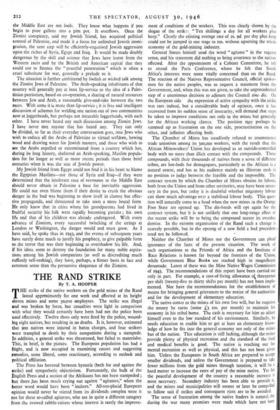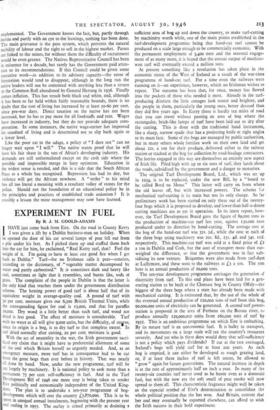THE RAND STRIKE
By T. A. HOOPER
THE strike of the native workers on the gold mines of the Rand lasted approximately for one week and affected at its height eleven mines and some 50,000 employees. The strike was illegal and was broken by force, but casualties were light in comparison with what they would certainly have been had not the police been used effectively. Twelve shots only were fired by the police, wound- ing eight natives, but resulting in no deaths. It is, however, estimated that 9oo natives were injured in baton charges, and four strikers were trampled to death by their companions during a stampede. In addition, a general strike was threatened, but failed to materialse. This, in brief, is the picture. The European population has had a fright, and is now occupied in examining causes and suggesting remedies, some liberal, some reactionary, according to outlook and political affiliation.
The Press has hovered between hysteria (both for and against the strike) and sympathetic objectivism. Fortunately, the bulk of the ting,lish Press and a section of the Afrikaans has not been stampeded; but there has been much crying out against "agitators," when the better word would have been "inciters." All-too-placid European opinion would never be stirred from its dividends complex were it not for these so-called agitators, who are in quite a different category from the avowed rabble-raisers whose interest is rarely the improve- ment of conditions of the workers. This was clearly shown by the slogan of the strike: "Ten shillings a day for all workers plus keep." Clearly the existing average rate of 2S. 9d per day plus keep could not be jumped in one stage to it's. without upsetting the whole economy of the gold-mining industry. General Smuts hiMself used the word-" agitator" in the vaguest sense, and his statement did nothing to bring assurance to the natives affected. After the appointment of a Cabinet Committee, he left to attend the Paris Conference, where he felt that South Africa's interests were more vitally concerned than on the Rand. The reaction of the Natives Representative Council, official spokes- men for the native peoples, was to request a statement from the Government, and, when this was not given, to take the unprecedented step of a unanimous decision to adjourn the Council sine die. On the European side the expression of active sympathy with the strike was rare indeed, but a considerable body of opinion, once it has recovered from its sudden sense of insecurity, will demand that steps be taken to improve conditions not only in the mines but generally for the African working classes. The position may perhaps be summed up as frustration on the one side, procrastination on the other, and inflation affecting both.
The Chamber of Mines has steadfastly refused to countenance trade unionism among its 300,000 workers, with the result that the African Mineworkers' Union has developed as an outside-controlled body with no more than illicit contact with the compounds. These compounds, with their thousands of natives from a score of different tribes, are hot-beds for demagogues, particularly as the African is a natural orator, and has as his audience mainly an illiterate mob in no position to judge between the feasible and the impossible. The contract system by which the Chamber of Mines obtains its labour, both from the Union and from other territories, may have been neces- sary in the past, but today it is doubtful whether migratory labour can show much advantage over a stabilised labour body. This ques- tion will naturally come to a head when the new mines in the Orange Free State are opened up. The die-hards will opt again for the contract system, but it is not unlikely that one long-range effect of the recent strike will be to bring the compound nearer its overdue demise. In the existent organisation of the Rand such a change is scarcely possible, but in the openng of a new field a bad precedent.
need not be followed. •
Neither the Chamber of Mines nor the Government can plead ignorance of the facts of the present situation. The work of such organisations as the Friends of Africa and the Institute of Race Relations is known far beyond the frontiers of the Union, while Government Blue Books are stacked high in 'magnificent desuetude. Latest of these was the Mine Native Wages Commission of 1943. The recommendations of this report have been carried out only in part. For example, a cost-of-living allowance 04 threepence per shift (twenty-five to thirty shifts per month) has not been imple- mented. Nor have the recommendations for the establishment of means for bringing general grievances to the notice of the authorities and for the development of elementary education.
The native comes to the mines of his own free will, but he requires the money he earns (some £3 los. per month) to maintain his economy in his tribal home. The cash is necessary for him to adjust himself even to the low standard of his environment. Similarly, he needs education to enable him to get at least an elementary know- ledge of how he fits into the general economy not only of the mines but of the nation. This education is still lacking, although the mines provide plenty of physical recreation and the standard of the food and medical benefits is good. The native is reaching out for mental recreation as well as physical, and this has not been given
him. Unless the Europeans in South Africa are prepared to accept smaller dividends, and unless the Government is prepared to take
fewer millions from the gold mines through taxation, it will be a hard matter to increase the rates of pay of the mine native. Yet for the peaceful development of the country a reasonable increase is
most necessary. Secondary industry has been able to provide it and the mines and municipalities will sooner or later be compelled to follow suit if strikes and 'consequent riots are to be avoided.
The sense of frustration among the native leaders is natural, for during the war many promises were made which have not been
implemented. The Government knows the fact, but, partly through inertia and partly with an eye to the hustings, nothing has been done. The main grievance is the pass system, which prevents the natural mobility of labour and the right to sell in the highest market. Passes are linked to the mines, for without them the difficulty of recruitment would be even greater. The Natives Representative Council has been in existence for a decade, but rarely has the Government paid atten- tion to its recommendations. If this Council could be given some executive work—in addition to its advisory capacity—the sense of frustration would tend to disappear, although in the long run the native leaders will not be contented with anything less than a return to the Common Roll abandoned by General Hertzog in 1936. Finally comes inflation. This has struck both black and white, and, although it has been so far held within fairly reasonable bounds, there is no doubt that the cost of living has increased by at least 50-60 per cent. since pre-war days. Direct taxation on the native has not been increased, but he has to pay more for all foodstuffs and rent. Wages have increased in industry, but they do not provide adequate com- pensation. In some instances, the native wage-earner has improved his standard of living and is determined not to slip back again to a lower level.
Like the poor cat in the adage, a policy of "I dare not" can no longer wait upon "I will." The native wants proof that he will have his fair share in the sun of Africa's developing industry. His demands are still unformulated except on the cash side where the possible and impossible merge in hazy optimism. Education in the widest sense is needed, and this is a side that the South African Press as a whole has recognised. Repression has had its day, but violence will get the African nowhere. A " strike " to his mind has all too literal a meaning with a resultant volley of stones for the police. Should not the foundation of an educational policy be in the principles and practices of established trade unionism ? It is possibly a lesson the mine management may now have learned.



























 Previous page
Previous page